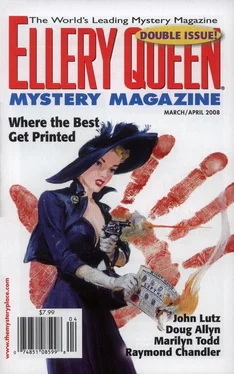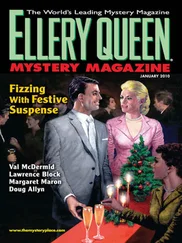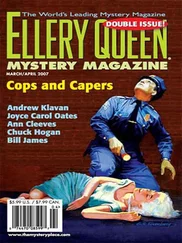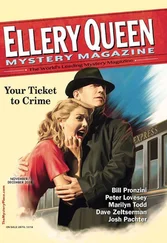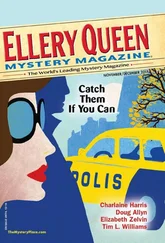Doug Allyn - Ellery Queen’s Mystery Magazine. Vol. 131, No. 3 & 4. Whole No. 799 & 800, March/April 2008
Здесь есть возможность читать онлайн «Doug Allyn - Ellery Queen’s Mystery Magazine. Vol. 131, No. 3 & 4. Whole No. 799 & 800, March/April 2008» весь текст электронной книги совершенно бесплатно (целиком полную версию без сокращений). В некоторых случаях можно слушать аудио, скачать через торрент в формате fb2 и присутствует краткое содержание. Город: New York, Год выпуска: 2008, ISBN: 2008, Издательство: Dell Magazines, Жанр: Детектив, на английском языке. Описание произведения, (предисловие) а так же отзывы посетителей доступны на портале библиотеки ЛибКат.
- Название:Ellery Queen’s Mystery Magazine. Vol. 131, No. 3 & 4. Whole No. 799 & 800, March/April 2008
- Автор:
- Издательство:Dell Magazines
- Жанр:
- Год:2008
- Город:New York
- ISBN:ISSN 0013-6328
- Рейтинг книги:5 / 5. Голосов: 1
-
Избранное:Добавить в избранное
- Отзывы:
-
Ваша оценка:
- 100
- 1
- 2
- 3
- 4
- 5
Ellery Queen’s Mystery Magazine. Vol. 131, No. 3 & 4. Whole No. 799 & 800, March/April 2008: краткое содержание, описание и аннотация
Предлагаем к чтению аннотацию, описание, краткое содержание или предисловие (зависит от того, что написал сам автор книги «Ellery Queen’s Mystery Magazine. Vol. 131, No. 3 & 4. Whole No. 799 & 800, March/April 2008»). Если вы не нашли необходимую информацию о книге — напишите в комментариях, мы постараемся отыскать её.
Ellery Queen’s Mystery Magazine. Vol. 131, No. 3 & 4. Whole No. 799 & 800, March/April 2008 — читать онлайн бесплатно полную книгу (весь текст) целиком
Ниже представлен текст книги, разбитый по страницам. Система сохранения места последней прочитанной страницы, позволяет с удобством читать онлайн бесплатно книгу «Ellery Queen’s Mystery Magazine. Vol. 131, No. 3 & 4. Whole No. 799 & 800, March/April 2008», без необходимости каждый раз заново искать на чём Вы остановились. Поставьте закладку, и сможете в любой момент перейти на страницу, на которой закончили чтение.
Интервал:
Закладка:
Three days later, I was convinced that Nate had developed a perverse sense of humor and had intentionally pointed me in the wrong direction. I’d spent the better part of seventy-two hours drinking German beer in trendy downtown bars, waiting in line outside the office of an AIDS activist who seemed to know every openly gay man in Shelby County, cruising rest areas in the greater Memphis area, and giving away cigarettes at bus stations all over town. No one recognized Don McAllister’s picture, knew his name, or seemed particularly bothered that he’d been killed.
From the work I’d done before the murder, I knew that McAllister had been an assistant manager at a Sycamore View Kroger. After I gave up haunting the local gay scene, I decided to talk to his coworkers. I spoke to the cashiers, the stock boys, the dairy manager, and the butcher, but all that anyone knew about Don McAllister was that he was never late, that he was a stickler for straight shelves, and that he ate pimento cheese on whole wheat every day for lunch.
“He was just an odd guy,” the head butcher, a gray-haired man with thin lips and thick, work-scarred hands said. “We took our lunch together for ten years, and I could count the amount of words he spoke on one hand. He just sat there, eating his sandwich, reading his photography magazines, until it was time to clock back in. Don was the last man on earth you’d suspect would end up murdered.”
“Photography magazines?”
“He had a slew of them. Kept them in his locker so he could read them at lunch.”
“They still around?”
“Probably.”
The lockers were just open storage crates with nametags. I hunkered in front of McAllister’s box, pulled out a couple of dozen photography magazines, and flipped through the pages. Most of the articles were technical, way over my head and way beyond the interest of a casual photographer. A few receipts for films, lenses, photo docks, and memory cards fell out. At the bottom of the crate was another receipt, this one from the Shelby County Photography Club, for a year’s membership dues. I stuck the receipt in my pocket. I wasn’t sure it was the right place to start looking, but at least it was some place to start. Besides that, it was the first indication I’d found that Don McAllister had had a life before someone took it away from him.
To my surprise, the Shelby County Photography Club seemed to be just that. Back when I’d spent a long and very unhappy year in Vice, “Photography Clubs” served as fronts for prostitutes, nude models, and groups of pedophiles who tried to pass their perversion off as art. But the Shelby County Photography Club seemed legit. Housed in the corner space of a strip mall on the edge of Cordova, the club was clean, orderly, its walls decorated with framed black-and-white photographs taken by its members. A sign over the reception desk announced the prices for camera rentals and advertised a workshop on documentary photography that was to be held at the end of the month. I wasn’t sure if I was relieved that the world seemed to be a slightly better place or disappointed that what might have been a real lead was fizzling like a wet firecracker.
The man who stepped from a back room to greet me was in his late forties or early fifties, sun-tanned, gray-haired, with very blue eyes. He wore spotless khakis, an olive-green polo shirt, John Lennon granny glasses, a thick gold wedding band, and a nametag that identified him as Blake Roberts, manager.
“Are you looking to become a member or just looking?”
I took a card from my back pocket and laid it on the desk. “I’d like to talk to you about Don McAllister.”
His smile faltered. “Oh,” he whispered. “Poor Don.”
Fifteen minutes later, I finished a cup of very good coffee while Roberts finished praising Don McAllister’s ability as a photographer, his virtue as a friend, and his overall decency as a human being. I was more than a little surprised. It wasn’t just that Roberts was the first person to say something truly nice about McAllister. He was the only person I’d talked to who had anything to say about him at all.
“So he was a serious photographer,” I said, cutting him off before he launched into another monologue. “It was more than just a hobby to him?”
He puckered his lips a little and then shrugged. “He had a lot of talent, a lot more than I have and a lot more than most of the professionals who teach workshops here have. But he had no interest in trying to make a living at it. I know for a fact that he turned down at least three offers to show his photographs in galleries. Photography was personal to Don.”
I nodded as if I understood and thought about the police report; there hadn’t been any mention of cameras or photography equipment in the evidence catalog from McAllister’s house. “His cameras,” I said. “Did he own them or rent them here?”
Roberts recoiled, the expression on his face the same as it would have been had I spilled my coffee on his plush white carpet. “Our equipment is strictly for amateurs. Don wouldn’t have been caught dead using one of those rentals.”
“Do you have any of his work here?”
His expression looked pained. “Yes,” he said, his voice barely above a whisper.
“Could you show me?”
“I’m not sure I should. I’m not sure you’ll understand.”
“Why not?”
Instead of answering, he opened his desk drawer, picked up a key, and then walked out of the room, his shoulders slumped as if I’d beaten him somehow. A few minutes later, he came back, handed me a leather portfolio, and then dropped back in his desk chair.
I don’t know a lot about photography, but I knew that Don McAllister had talent. His photographs throbbed with color and light. Then, as I kept flipping through the portfolio, I stopped thinking about Don McAllister’s talent and focused on the subjects. Children. Every single photograph was of a child or a family with children. They were taken at municipal parks, at playgrounds and schoolyards, at Liberty Land and the Memphis Zoo, and at the River Walk Park. All of the photographs were candid, none even slightly risqué, and most seemed taken without the children or their parents being aware. I stared at the last picture in the album. It was taken at Riverside Park on a sunny afternoon. The park was packed. There were a half-dozen faces in the background but they were white noise, unimportant. Don McAllister’s camera had been squarely focused on a towheaded boy of six or seven. Looking at the picture made me uneasy.
“Were all of his pictures like this?”
“Good, you mean?”
“Of children.”
“Families and children, yes.” He took the portfolio away from me as if I were unfit to handle it. “Can’t you feel the love he expressed in those photographs?”
“He was a pedophile?”
Roberts closed his eyes. “You’ve no right to say that. Don was a decent, decent man.”
“He was obsessed with children.”
“Yes, but it wasn’t dirty.”
“You know that for a fact?”
“I do,” he said, opening his eyes to meet mine in a challenge. “I most certainly do.” He stood from behind his desk. “Everything isn’t dirty, you know? You’ve no right to come in here and say it is.”
“You’re in denial about your friend.”
His face reddened and his eyes bulged until I thought he was either going to leap across the desk or suffer a stroke in his effort not to. “He took those photographs because he didn’t have a family of his own. That’s what his art did for Don. It gave him back something he’d lost.”
“He had a family. A son. He walked out on them, never went back.”
“He had no choice.”
“Everybody has a choice. Sometimes it’s convenient to believe we don’t.”
Читать дальшеИнтервал:
Закладка:
Похожие книги на «Ellery Queen’s Mystery Magazine. Vol. 131, No. 3 & 4. Whole No. 799 & 800, March/April 2008»
Представляем Вашему вниманию похожие книги на «Ellery Queen’s Mystery Magazine. Vol. 131, No. 3 & 4. Whole No. 799 & 800, March/April 2008» списком для выбора. Мы отобрали схожую по названию и смыслу литературу в надежде предоставить читателям больше вариантов отыскать новые, интересные, ещё непрочитанные произведения.
Обсуждение, отзывы о книге «Ellery Queen’s Mystery Magazine. Vol. 131, No. 3 & 4. Whole No. 799 & 800, March/April 2008» и просто собственные мнения читателей. Оставьте ваши комментарии, напишите, что Вы думаете о произведении, его смысле или главных героях. Укажите что конкретно понравилось, а что нет, и почему Вы так считаете.
